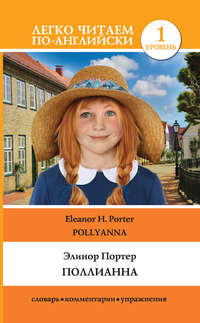Czytaj książkę: «Поллианна / Pollyanna»
Адаптация текста, упражнения, комментарии и словарь А. А. Вертягиной
© Вертягина А. А.
© Пилипюк Д.
© ООО «Издательство АСТ», 2017
Chapter I. Miss Polly
Miss Polly Harrington entered her kitchen a little hurriedly this June morning. Nancy, who was washing dishes at the sink, looked up in surprise.
“Nancy!”
“Yes,ma’am.1” Nancy answered cheerfully, but she still continued to wipe a pitcher in her hand.
“Nancy, when I’m talking to you,I wish you to stopyour work and listen to what I say.”
Nancy flushed. She set the pitcher down at once.
“Yes, ma’am.” Nancy said. She was wondering if she could ever please this woman.Nancy had never worked for anybody before;2 but her mother was a widow with three younger children besides Nancy herself. So she was very pleased when she found a place in the kitchen of the great house on the hill. Nancy came from “The Corners,” six miles away, and she knew Miss Polly Harrington only as the mistress of the old Harrington homestead. That was two months before. She knew Miss Polly now as a stern woman who frowned if a knife clattered to the floor, or if a door banged.
“Finish your morning work, Nancy,” Miss Polly said, “and clear the little room in the attic and make up the cot bed. Sweep the room and clean it, of course, after you clear out boxes.”
Miss Polly hesitated, then went on: “I suppose I may as well tell you now, Nancy. My niece, Miss Pollyanna Whittier, will soon live with me. She is eleven years old, and she will sleep in that room.”
“A little girl will soon be here, Miss Harrington?Oh, won’t that be nice!3” cried Nancy.
“Nice? Well, that isn’t exactly the word I should use,” said Miss Polly, stiffly. “However, I am a good woman, I hope; and I know my duty.”
“Don’t forget to clean the corners, Nancy,” she finished sharply, as she left the room.
“Yes, ma’am,” sighed Nancy.
In her own room, Miss Polly took out once more the letter whichshe had received4 two days before. The letter was addressed to Miss Polly Harrington, Beldingsville, Vermont; and it read as follows:
“Dear Madam: – I regret to inform you that the Rev. John Whittier died two weeks ago, leaving one child, a girl eleven years old.
“I know he was your sister’s husband, but he gave me to understand the familieswere not on the best of terms5. He thought, however, that you might wish to take the child and bring her up. Hence I am writing to you.
“Hoping to hear favorably from you soon, I remain,
“Respectfully yours,
“Jeremiah O. White.”
Miss Polly answered the letter the day before, andshe had said she would take the child,6 of course.
As she sat now, with the letter in her hands, her thoughts went back to her sister, Jennie, Pollianna’s mother, and to the time when Jennie, as a girl of twenty, married the young minister and went south with him. The family had little more to do with the missionary’s wife.








